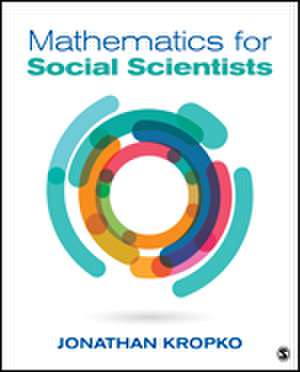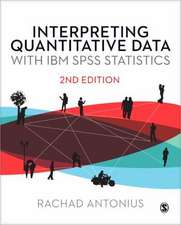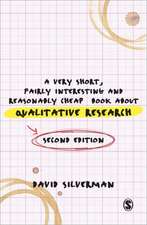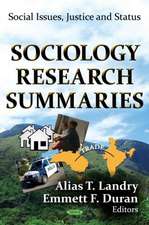Mathematics for Social Scientists
Autor Jonathan M. Kropkoen Limba Engleză Paperback – 9 noi 2015
Preț: 567.82 lei
Preț vechi: 701.01 lei
-19% Nou
Puncte Express: 852
Preț estimativ în valută:
108.66€ • 113.96$ • 90.45£
108.66€ • 113.96$ • 90.45£
Carte disponibilă
Livrare economică 11-25 martie
Preluare comenzi: 021 569.72.76
Specificații
ISBN-13: 9781506304212
ISBN-10: 1506304214
Pagini: 408
Dimensiuni: 187 x 232 x 27 mm
Greutate: 0.7 kg
Ediția:1
Editura: SAGE Publications
Colecția Sage Publications, Inc
Locul publicării:Thousand Oaks, United States
ISBN-10: 1506304214
Pagini: 408
Dimensiuni: 187 x 232 x 27 mm
Greutate: 0.7 kg
Ediția:1
Editura: SAGE Publications
Colecția Sage Publications, Inc
Locul publicării:Thousand Oaks, United States
Recenzii
“Students in the social and behavioral sciences increasingly need a solid foundation of mathematical knowledge to be able to contribute to the research literature and be able to keep themselves current on new methodology. Unfortunately, math department classes really are not tailored to their needs. Mathematics for Social Scientists, on the other hand, is clearly aimed at what students need to be able to advance in subsequent methodology courses and in their future careers. It is written in an inviting and clear manner, without ever sacrificing rigor.”
“Many students entering higher-level statistics classes have somehow forgotten their basic statistics or were never properly exposed to more than a cookbook explanation. More often than not, a student will leave the course without an understanding of probability, random variables, basic distribution theory and concepts etc. Without some background, it proves difficult for students to catch up with these ideas when they are introduced (or assumed to be known) in more advanced courses. This gap is especially pronounced between those students who were exposed to basic probability in a previous course and those who were not. Mathematics for Social Scientists will be a great resource for an instructor wishing to add this content to a basic statistics course as well as for the motivated self-learner.”
“Many students entering higher-level statistics classes have somehow forgotten their basic statistics or were never properly exposed to more than a cookbook explanation. More often than not, a student will leave the course without an understanding of probability, random variables, basic distribution theory and concepts etc. Without some background, it proves difficult for students to catch up with these ideas when they are introduced (or assumed to be known) in more advanced courses. This gap is especially pronounced between those students who were exposed to basic probability in a previous course and those who were not. Mathematics for Social Scientists will be a great resource for an instructor wishing to add this content to a basic statistics course as well as for the motivated self-learner.”
Cuprins
Part I: ALGEBRA, PRECALCULUS, AND PROBABILITY
1. Algebra Review
Numbers
Fractions
Exponents
Roots
Logarithms
Summations and Products
Solving Equations and Inequalities
2. Sets and Functions
Set Notation
Intervals
Venn Diagrams
Functions
Polynomials
3. Probability
Events and Sample Spaces
Properties and Probability Functions
Counting Theory
Sampling Problems
Conditional Probability
Bayes' Rule
PART II: CALCULUS
4. Limits and Derivatives
What is a Limit?
Continuity and Asymptotes
Solving Limits
The Number e
Point Estimates and Comparative Statics
Definitions of the Derivative
Notation
Shortcuts for Finding Derivatives
The Chain Rule
5. Optimization
Terminology
Finding Maxima and Minima
The Newton-Raphson Method
6. Integration
Informal Definitions of an Integral
Riemann Sums
Integral Notation
Solving Integrals
Advanced Techniques for Solving Integrals
Probability Density Functions
Moments
7. Multivariate Calculus
Multivariate Functions
Multivariate Limits
Partial Derivatives
Multiple Integrals
PART III: LINEAR ALGEBRA
8. Matrix Notation and Arithmetic
Matrix Notation
Types of Matrices
Matrix Arithmetic
Matrix Multiplication
Geometric Representation of Vectors and Transformation Matrices
Elementary Row and Column Operations
9. Matrix Inverses, Singularity, and Rank
Inverse of a (2 x 2) Matrix
Inverse of a Larger Square Matrix
Multiple Regression and the Ordinary Least Squares Estimator
Singularity, Rank, and Linear Dependency
10. Linear Systems of Equations and Eigenvalues
Nonsingular Coefficient Matrices
Singular Coefficient Matrices
Homogeneous Systems
Eigenvalues and Eigenvectors
Statistical Measurement Models
1. Algebra Review
Numbers
Fractions
Exponents
Roots
Logarithms
Summations and Products
Solving Equations and Inequalities
2. Sets and Functions
Set Notation
Intervals
Venn Diagrams
Functions
Polynomials
3. Probability
Events and Sample Spaces
Properties and Probability Functions
Counting Theory
Sampling Problems
Conditional Probability
Bayes' Rule
PART II: CALCULUS
4. Limits and Derivatives
What is a Limit?
Continuity and Asymptotes
Solving Limits
The Number e
Point Estimates and Comparative Statics
Definitions of the Derivative
Notation
Shortcuts for Finding Derivatives
The Chain Rule
5. Optimization
Terminology
Finding Maxima and Minima
The Newton-Raphson Method
6. Integration
Informal Definitions of an Integral
Riemann Sums
Integral Notation
Solving Integrals
Advanced Techniques for Solving Integrals
Probability Density Functions
Moments
7. Multivariate Calculus
Multivariate Functions
Multivariate Limits
Partial Derivatives
Multiple Integrals
PART III: LINEAR ALGEBRA
8. Matrix Notation and Arithmetic
Matrix Notation
Types of Matrices
Matrix Arithmetic
Matrix Multiplication
Geometric Representation of Vectors and Transformation Matrices
Elementary Row and Column Operations
9. Matrix Inverses, Singularity, and Rank
Inverse of a (2 x 2) Matrix
Inverse of a Larger Square Matrix
Multiple Regression and the Ordinary Least Squares Estimator
Singularity, Rank, and Linear Dependency
10. Linear Systems of Equations and Eigenvalues
Nonsingular Coefficient Matrices
Singular Coefficient Matrices
Homogeneous Systems
Eigenvalues and Eigenvectors
Statistical Measurement Models
Notă biografică
Descriere
A non-intimidating approach to learning or reviewing math skills essential in quantitative research methods.











